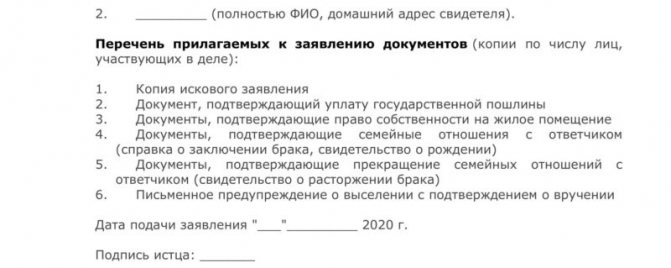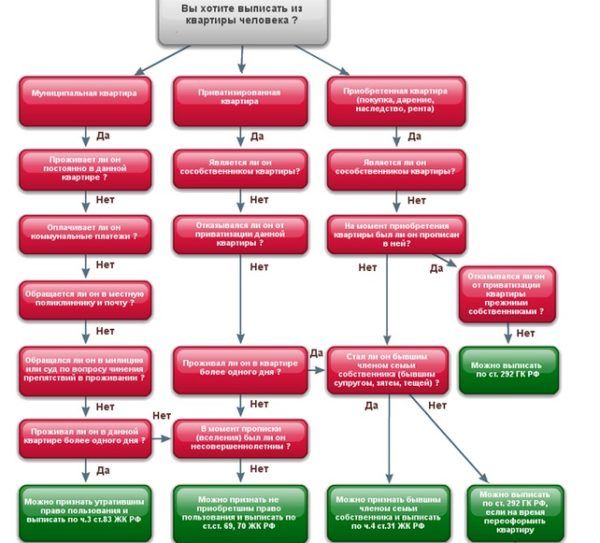Home / Housing disputes / Eviction of ex-spouse from owner’s apartment
The divorce process is accompanied by the division of property, which includes determining the right to use residential premises. You can sort things out for an endlessly long time - but the law clearly states how to evict your ex-spouse upon divorce. Few ex-spouses continue to live together after a divorce. Most often they go in different directions.
There are two main categories - living in municipal housing under a social tenancy agreement and owning your own apartment. We will provide the nuances of evicting a former spouse from such a living space in our article. At the same time, you can learn how to evict a registered person from an apartment without his consent?
Is it possible to evict an ex-spouse from an apartment?
Housing legislation gives a clear idea of whether it is possible to move ex-spouses out of an apartment after a divorce in the registry office. Termination of a family relationship automatically cancels the spouse’s rights to use the apartment (Clause 4, Article 31 of the Housing Code of the Russian Federation). The term use refers not only to registration, but also to actual residence within the apartment.
The procedure for eviction of a former spouse from an apartment is possible in the following cases:
- The owner of the property is one of the spouses, and the other has no shares in the apartment.
- The residential premises were purchased by the spouse before marriage or were received as an inheritance (gift) during the marriage relationship.
- There was no agreement between the spouses regarding the right to use the housing.
These grounds indicate ownership of the apartments on the part of one spouse. The second has no rights, which means he can be evicted from the apartment at the end of his family life . For example, forcibly through the court and bailiffs.
When you can't write out your ex-spouse
It is not easy to evict an ex-spouse and discharge him from a shared living space. If a partner has nowhere to go after a divorce and becomes homeless, then the court will not comply with the owner’s demands.
Factors prohibiting the removal of a former family member from an apartment:
- The spouse received the right to use upon concluding an agreement with the owner of the living space. You will need to first terminate the contract, otherwise it is impossible to legally evict.
- The court found that both partners have the same right to use the apartment. In this case, the spouse can only be evicted by challenging the court decision.
- Spouses have equal rights to housing, registered during the privatization of the apartment.
Denis Lvovich
Family Lawyer. More than 10 years of experience
Ask a Question
In other cases, the owner can legally evict the spouse from his apartment after a divorce.
Grounds and methods of eviction
Legal practice knows two ways to evict a person from an apartment: voluntary and forced. It is better, of course, to reach an amicable agreement . But if there are simply no other options left, you will have to go to court and prove the fact that the spouse has lost the right to use housing.
Today there are several reasons to evict an ex-spouse from an apartment:
- The end of the relationship with the evicted person - on the basis of a certificate of dissolution of the marriage union in the registry office.
- Sale of an apartment - the issue of eviction of the former spouse will be resolved in court by the new owner (clause 2 of Article 292 of the Civil Code of the Russian Federation).
- The expiration of the rental agreement for residential premises - renewing the agreement with the apartment manager aims to evict the ex-spouse.
- Long-term absence of the former spouse from the place of residence - absence alone may not be enough, but if it is supplemented by failure to pay utility bills, then this is a clear reason to evict the person through the court.
- The presence of a condition of the marriage contract - the contract may stipulate that after the divorce the spouse moves out of the other spouse’s apartment.
Expert opinion
Dmitry Nosikov
Lawyer. Specialization: family and housing law.
Separately, it should be said about the cohabitation of a man and a woman. Termination of cohabitation is grounds for evacuation of the non-owner of the apartment. The housing manager can act in his own interests - if the former cohabitant does not want to leave the living space he occupies, the police can be involved. We have prepared step-by-step instructions in the article “What to do and how to evict citizens living in an apartment illegally?”
Eviction from the owner’s apartment - judicial practice
In court practice, cases of termination of use of premises and deregistration occur quite often.
When considering them, the court proceeds from the existing circumstances of the case and the requirements of the law. Such cases always require a thorough investigation to ensure that no one’s housing rights are violated. The court is required to determine whether there are grounds to recognize the defendant as having lost the right to reside in a particular premises. If the legal grounds for using housing are lost or violations are committed during its use, the owners may lose their housing.
The video story will tell you how eviction from an apartment occurs through the court and deregistration
How to evict your ex-husband from an apartment through court
Having chosen the eviction method, you can begin collecting documents and filing a claim. Complaints and appeals are accepted according to civil jurisdiction - eviction cases are considered in the district court (Article 24 of the Code of Civil Procedure of the Russian Federation).
Procedure
Instructions for evicting a former spouse from a privatized apartment in 2021:
- The first step is to analyze the eviction and select the grounds .
- Next, the property owner notifies the ex-spouse of the need to vacate voluntarily. If your request is refused or ignored, you can proceed to the next step.
- Preparation of a statement of claim - it indicates basic information about the dispute, evidence in favor of eviction, rights to an apartment, requirements for the court and other information. From October 1, 2021, it is necessary to notify the opposing party in advance. Therefore, the plaintiff sends the defendant a valuable letter listing the attachments and a notification of delivery. The inventory consists of a statement of claim and documents that will be submitted to the court.
- Send documents to the court - consideration of the claim usually takes up to 5 business days, after which the court will invite both parties to court hearings.
- Participation in hearings - it is not necessary to appear in court yourself; you can resort to the help of your friends or a lawyer. But before this, you will need to draw up a power of attorney to transfer powers to the selected representative.
- Wait until the decision comes into force - a month is allotted for this + 10 days for preparing a writ of execution.
- Take a copy of the court order .
- Submit the court decision to the migration authority or housing department - the registrars will deregister the tenant from the apartment.
- Writing a statement to the bailiffs is important if the ex-spouse is creating obstacles to eviction and does not want to move out of the apartment.
- Permanently evict the ex-spouse .
Let us say right away that the procedure is lengthy. It is not very convenient to deal with all issues alone. Therefore, in order to avoid difficulties, it is advisable to enlist the support of a qualified lawyer.
Example: By marrying Kuzmenko E.V., citizen Petrov V.V. owned a 2-room apartment. He got the property based on a gift agreement from his grandmother. As soon as the young people formalized their family relationship, Kuzmenko moved to Petrov. The girl did not have her own home; before that, she temporarily lived in a hostel. The couple's family life was not entirely successful. Kuzmenko did not work anywhere, abused alcohol, constantly annoyed her husband and tried to take the apartment into her own hands. Tired of constant scandals, Petrov filed for divorce - the dissolution of the marriage took place. Soon Petrov notified his wife that he was evicting her from the apartment. But Kuzmenko refused in every possible way to move out voluntarily. The man went to court at the place where the property was registered. The claims were as follows: family relationships have ceased (clause 4 of Article 31 of the RF Housing Code), the apartment belongs to the plaintiff, the wife has no rights to housing, the couple has no children together, the defendant led a riotous lifestyle - the plaintiff asks to be discharged and evicted from apartments.
Having examined the case, the court satisfied the claims. But due to the housing difficulties of his ex-wife, he gave her a deferment for eviction. The period was 6 months, after which Kuzmenko was obliged to move out of Petrov’s apartment.
Documents for eviction
Judicial proceedings require the preparation of a complete package of documents. The responsibility to collect evidence in favor of eviction rests with the plaintiff and his representatives. The package of documents may change. It all depends on the circumstances of the case and the claims being made.
The main list of documents for eviction from an ex-spouse’s apartment:
- a copy of the applicant's (plaintiff's) passport;
- notification of delivery of the claim and documents to the defendant (former spouse);
- power of attorney and a copy of the representative’s passport – if the interests are represented by a trusted person (lawyer);
- certificate of ownership of the apartment or extract from the Unified State Register of Real Estate;
- an approved social tenancy agreement or order (before 2005) - if the housing belongs to the municipality;
- an extract from the house register with the obligatory indication of the name of the evicted citizen;
- certificate of divorce (from the registry office);
- written notifications to the ex-spouse to vacate voluntarily (copies of notifications, postal inventory, copies of receipt, copies of return responses);
- a copy of the marriage contract (if available);
- receipt of payment of state duty;
- other documents.
The above package of documents is submitted together with the statement of claim. Along with the originals, the plaintiff must have copies of important documents. It would be a good idea to have some of them certified by a notary. It is best to consult with the lawyers of our portal about all the nuances.
Statement of claim
The legal structure of an eviction claim consists of the following points:
Part – Introductory:
- full name of the judicial body of general jurisdiction;
- Full name, address details and contacts of the plaintiff;
- Full name, address, SNILS, INN and passport details of the second spouse.
Part – Descriptive:
- why the plaintiff decided to file a claim;
- on what basis does the owner want to evict the ex-spouse (tenancy agreement, marriage contract);
- information about whether attempts were made to resolve the conflict at the pre-trial stage, and how exactly (written notices, witness statements, etc.).
Part – Motivational:
- reference to regulatory legal acts that regulate the issue of eviction from residential premises (articles of the Civil and Housing Code).
Part – Petition:
- the main conclusion of the plaintiff;
- the requirement is to remove the defendant from the registration register and evict him from the apartment (or simply evict him if there is no registration);
- list of attachments (documents and evidence);
- date, month, year and signature with explanation.

The main thing in drafting a claim is not to miss key details. The judge makes a decision based on the information provided by the plaintiff. Insufficient evidence will negate all efforts to evict the ex-spouse from the living space.
Do not forget to read in more detail how to correctly draw up a statement of claim for eviction from an apartment so that it reaches the addressee and is considered by the court?
Deadlines
The final decision is made based on the financial situation of the ex-spouse. Let's say he has a place to live and is not experiencing financial difficulties - eviction after the trial will take up to 7 days .
The opposite situation is when the spouse has nowhere to move out. Then the court has the right to grant a deferment for a period of 3 months to 1 year . If necessary, the period can be extended (see “Delay of execution of a court decision on eviction from an apartment”).
State duty
Standard claims for eviction from an apartment are paid.
The state fee for applying to a district court is 300 rubles (clause 3, clause 1, article 333.19 of the Tax Code of the Russian Federation).
The obligation to pay the contribution rests with the plaintiff. However, under current rules, if the plaintiff wins the case, the plaintiff can recover costs from the defendant. Moreover, not only legal costs are subject to compensation, but also the plaintiff’s expenses for lawyers and examinations.
The nuances of eviction of an ex-spouse:
*From a municipal apartment
The main feature is living in residential premises under a social tenancy agreement. Or another example, the eviction of students from a dormitory at a higher educational institution - how to do everything according to the law or protect your rights, read our material.
If it is registered
The former spouse may be a family member of the public housing tenant. Consequently, after the divorce, he will retain the right to live in such an apartment (clause 4 of article 69 of the Housing Code). It is impossible to evict a registered ex-husband from public housing even through the courts.
However, there is an option for exchanging a privatized apartment, if available. The divorced spouse will receive separate housing and will be able to move out. If he constantly rejects options for moving, he will have to involve the court as an independent mediator.
Read about various nuances in the article “Eviction of a registered person from a non-privatized apartment.”
If it is not registered
It is much easier to evict your ex-spouse if he only lives, but is not registered in a municipal apartment. In legal terms, the second spouse is not a member of the employer’s family. The process occurs by filing a complaint to the administration. If the ex-spouse refuses to leave the home, law enforcement agencies can be involved.
*From privatized housing
It is considered private property, owned by individuals on the basis of a privatization agreement, and in subsequent transactions with housing - purchase and sale agreements, rental agreements, donations, etc.
If it is registered
Registration in a privatized apartment gives the right to live in it with the consent of the owner. Although the ex-husband does not have rights to the apartment, it is not possible to simply evict him. For this, the owner must have good reasons. One of these is divorce.
The eviction process occurs together with the checkout from the privatized apartment. But here it should be noted that if the ex-spouse does not have an alternative place of residence, the court will allow him to live in the apartment for 3 months or longer. Moreover, if the owner of the apartment pays alimony, the evicted person can sue in order to obtain a separate area.
If it is not registered
Situations with no registration in an apartment are much simpler. For example, a man owned an apartment before marriage, and after formalizing the family relationship, he moved his wife into it. If there was no registration, then the right to be in the apartment to third parties can only be given by the owner . Therefore, after a divorce, the owner of the apartment will simply evict his ex-wife “to nowhere.”
Owner
It will not be possible to evict the owner-spouse from the apartment under any circumstances. Not a single Russian court will sign such a resolution. It is prohibited to alienate a person’s property unless there are compelling reasons for doing so . Divorce is not such a reason. Thus, there is no talk of eviction of the owner from the privatized apartment.
Not the owner
The simplest option is to evict a person who is not registered in the apartment and is not its owner. There are two ways to do this: ask your ex-spouse to move out voluntarily or go to court. There, the owner must prove that he is the sole owner of the apartment. True, there is also a deferment factor for eviction. A person will not be evicted if he has nowhere to live or if he receives alimony from the other spouse.
From privatized living space
The owner can easily evict or expel the ex-spouse from his living space. If a person does not agree to move voluntarily, then the eviction is carried out forcibly through the court. All relatives of the husband (except for common children) also no longer have rights to living space.

If the apartment was privatized during marriage, then it is more difficult to evict the spouse . The law states that after a divorce, neither partner loses the right to housing. In this case, it is impossible to forcibly discharge a person.
The ex-husband or wife can sell their part or voluntarily transfer the rights to use the apartment.
If in a marriage, during the privatization of housing, one of the partners renounced ownership rights and confirmed his decision in writing, then he has no right to the property, but remains registered in the apartment.
It is impossible to remove a spouse from registration with the registration authorities without his consent. To do this, you will need to draw up a deed of donation of living space to a third party. Then the new owners, through the court, discharge the old tenants.
It is important to remember that no judge can send a person to nowhere. If the ex-spouse has nowhere to live, then he cannot be discharged. A change in legal status does not in any way affect the right to use the apartment. A person can still dispose of his part of the home as before.
Arbitrage practice
Proceedings in court have a different focus. Regular evictions are resolved as usual. If the case involves minors or there are alimony obligations, the court examines life situations.
Often the disputes are as follows: divorce of spouses who have a minor child . It is logical to assume that the baby will be left with the mother. For example, if her ex-husband evicts her from his apartment, the court will delay the procedure. Most likely, the property owner will be required to provide the mother and child with alternative living space. The second option is to allow the mother and child to live in the apartment of the former spouse until the child reaches adulthood. The third and most common is that the mother and child move to another apartment, and the father pays the costs of its maintenance (rent, mortgage payments).
Example: The court received an appeal from Kuchin regarding his wife. The couple was planning to file for divorce, and the owner of the apartment wanted to evict his future ex-wife in advance. The woman was six months pregnant, so the court did not even consider the case. According to the provisions of the law, the husband does not have the right to initiate a divorce during the wife’s pregnancy and until the child turns one year old (Article 17 of the RF IC). Repeated requests to evict the pregnant wife from the apartment were also rejected. Even if eviction were possible, the court would prohibit evicting a pregnant spouse from an apartment without an alternative place of residence.
Legal assistance
Legal issues often baffle people. It’s one case if the case is resolved at the pre-trial stage, and a completely different one when you have to go to court. Preparing the grounds, collecting documents, determining jurisdiction, drawing up a claim, speaking in court - all this leaves its mark on the success of eviction of the ex-spouse. It is simply unrealistic to do a huge amount of work alone.
A free consultation with lawyers on our portal partially relieves you of information processing.
By contacting us, you will be able to understand what to do - our lawyers have experience in handling housing cases, which means they will help you even in the most complex dispute. The consultation aims to analyze the situation from start to finish, prepare a legal opinion, draw up an algorithm of actions, select a sample statement of claim, and decide on a package of documents. You can learn this and much more from a conversation with our lawyer. Attention!
- Due to frequent changes in legislation, information sometimes becomes outdated faster than we can update it on the website.
- All cases are very individual and depend on many factors. Basic information does not guarantee a solution to your specific problems.
That's why FREE expert consultants work for you around the clock!
- via the form (below), or via online chat
- Call the hotline:
- Moscow and the Region
- St. Petersburg and region
- FREE for a lawyer!

By submitting data you agree to the Consent to PD Processing, PD Processing Policy and User Agreement.
Anonymously
Information about you will not be disclosed
Fast
Fill out the form and a lawyer will contact you within 5 minutes
Tell your friends
Rate ( 2 ratings, average: 5.00 out of 5)
Author of the article
Maxim Privalov
Lawyer. 2 years of experience. I specialize in civil disputes in the field of housing and family law.
Author's rating
Articles written
610





